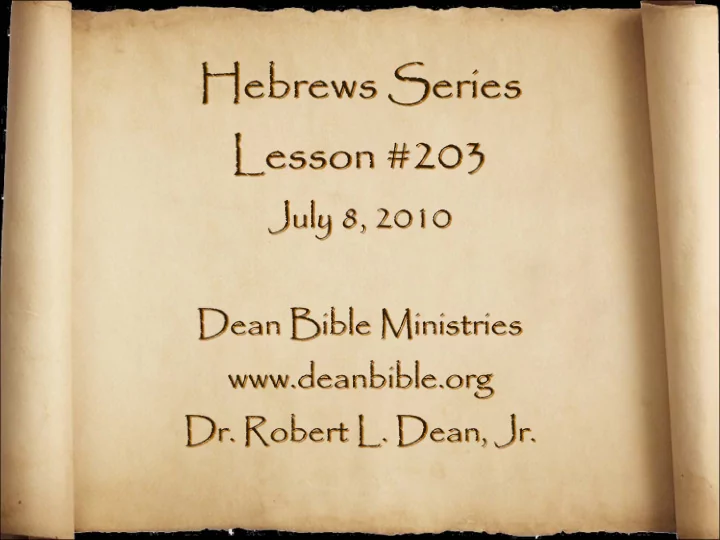

Hebrews 12:12–14
Section Five: 11:1–13:25 Instruction: 11:1–40 Practical Challenge: Focus on Christ 12:1–29 12:1–2 Christ set the example of endurance. 12:3–11 The believer endures training in order to be a useful, mature believer. 12:12–17 Conclusion: We must become strong spiritually, to enjoy the blessings of a full reward in heaven. 12:18–29 Explains how this flows from the superior new covenant. Warning: 12:25–29
A metaphor is an unstated comparison: one thing is another, whereas a simile states that one thing is like or resembles another. While the simile says “All flesh is as grass” (1 Pet. 1:24), the metaphor carries the figure across at once, and says “All flesh is grass” (Isa. 40:6). This is the distinction between the two. E. W. Bullinger, Figures of Speech in the Bible
The two nouns themselves must both be mentioned, and are always to be taken in their or else no one can tell what they mean. The figure lies wholly in the verb, or copula, which, in English, must always be expressed, and never understood by ellipsis. For example, “All flesh is grass.” Here “flesh” is to be taken literally as the subject spoken of, and “grass” is to be taken equally literally as that which represents “flesh.” All the figure lies in the verb “is.” E. W. Bullinger, Figures of Speech in the Bible
“A figure of speech in which one thing is called by the name of something else, or is said to be that other thing. Unlike similes, which use like or as , metaphorical comparisons are implicit—not explicit.” Garner’s Modern American Usage
Heb. 12:3, “For consider Him who endured such hostility from sinners against Himself, lest you become weary and discouraged in your souls.”
Heb. 12:3, “For consider Him who endured such hostility from sinners against Himself, lest you become weary and discouraged in your souls.” ka¿mnw kamno “to tire with exertion, labor to weariness; to be wearied, tired out, exhausted, be discouraged”
Heb. 12:3, “For consider Him who endured such hostility from sinners against Himself, lest you become weary and discouraged in your souls.” ka¿mnw kamno e ˙ klu/w ekluo “to tire with “ become exertion, labor to discouraged, weary, weariness; to be or weak” (12:3, 5) wearied, tired out, exhausted, be discouraged”
Heb. 12:12, “Therefore strengthen the hands which hang down, and the feeble knees,”
Isa. 35:3, “Strengthen the weak hands, and make firm the feeble knees. Isa. 35:4, “Say to those who are fearful-hearted, ‘Be strong, do not fear! Behold, your God will come with vengeance, with the recompense of God; He will come and save you.’ ”
Heb. 12:12, “Therefore strengthen the hands which hang down, and the feeble knees,”
Zeph. 3:16, “In that day it shall be said to Jerusalem: ‘Do not fear; Zion, let not your hands be weak.’ ”
Zeph. 3:5, “The LORD is righteous in her midst, He will do no unrighteousness. Every morning He brings His justice to light; He never fails, but the unjust knows no shame.”
Zeph. 3:5, “The LORD is righteous in her midst, He will do no unrighteousness. Every morning He brings His justice to light; He never fails, but the unjust knows no shame.” qyî;dAx tzaddiq “righteous”
Zeph. 3:5, “The LORD is righteous in her midst, He will do no unrighteousness. Every morning He brings His justice to light; He never fails, but the unjust knows no shame.” qyî;dAx tzaddiq lD…wAo ‘awwal “righteous” “unjust”
Zeph. 3:13, “The remnant of Israel shall do no unrighteousness” lD…wAo ‘awwal “unjust”
Zeph. 3:16, “In that day it shall be said to Jerusalem: ‘Do not fear; Zion, let not your hands be weak.’ ”
Metonomy of the effect put for the cause Metonomy is a figure of speech where one noun is placed for another.
Job 4:3, “Behold you have admonished many, and you have strengthened weak hands.”
Heb. 12:12, “Therefore strengthen the hands which hang down, and the feeble knees,” aÓnorqo/w anorthoo Aorist active imperative Priority command “ to restore to straightness or erectness, to build something up again after it has fallen, rebuild, restore, to become erect from a bent position, straighten up”
Recommend
More recommend